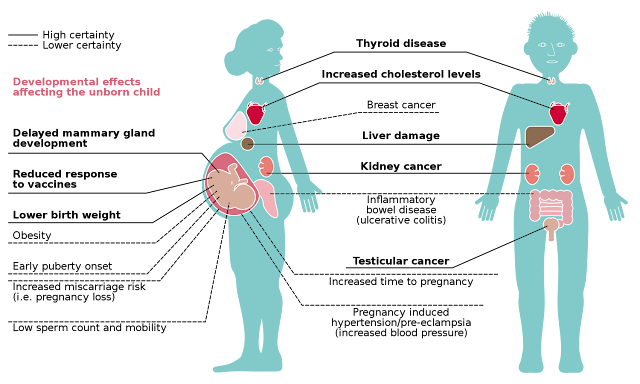Do any of us truly know what's going on in the world? What bad thing is somebody doing but they don't know it's bad, or what bad thing is somebody doing but they know it's bad and do it anyway, downplaying the bad, because the want to make a profit?
|
I found the following video startling. I knew nothing about this, and it would seem the industry has done little to educate the public. Once again, the motivation for suppressing information seems to be wanting to make a profit. What we don't know won't kill us, right?
Published on Oct 4, 2021 by LastWeekTonight
YouTube: PFAS: Last Week Tonight with John Oliver (HBO) (19:57)
John Oliver discusses PFAS — a class of chemicals linked to an array of health issues — and why their widespread use isn’t as magical as it may seem.
Final Word
I was born in 1952. When I was growing up, I never heard of anyone having a peanut or tree nut allergy. Nowadays, I don't think you can go to any public venue, mall, cinema, or school, where the first aid kit does not include an Epi pen. What happened? What changed? Where did this relatively new health issue come from? In talking with several teachers, I discovered this issue seems to have first appeared in the school system around the mid to late 1980s. By the mid-1990s, just about every school had an Epi pen. Research into the cause of this seemingly new problem is unclear but points to the hygiene hypothesis, not being exposed to certain substances causes the body to not develop an immunity to said substance. Is this a change in how we live our lives in modern times? What new factors have come into play to produce this health issue?
A significant number of people including members of my own family think vaccines cause autism. The Wikipedia link I've given below points to scientific studies that have failed to show such a causal connection. People keep believing it, but the science doesn't support it. Consequently, here's my concern. This issue about PFAS is completely new to me. There are many things going on in the world I know nothing about. It would seem there are many things going on people know little or nothing about, and what problems are those things causing? As with the examples I gave in the beginning about the tobacco, fossil fuels, and sugar industries, information about PFAS has been suppressed or downplayed, all in the name of profit. Think vaccines cause autism? Have you checked off everything else which could potentially be on the list?
I'm betting nobody knows about PFAS. What's the big deal? Out of sight, out of mind. However, now, these "forever substances" are everywhere, used in many products which make up our daily lives. But everywhere has a second meaning, these substances being in the environment around the globe and in the body of every human on the planet. Peanut allergies? Autism? Are we inadvertently and unknowingly poisoning ourselves?
References
Wikipedia: Per- and polyfluoroalkyl substances
Per- and polyfluoroalkyl substances (PFASs) are synthetic organofluorine chemical compounds that have multiple fluorine atoms attached to an alkyl chain. ... A U.S. Environmental Protection Agency (EPA) toxicity database, DSSTox, lists 10776 PFASs. ... PFOS, PFOA and other PFASs are known to persist in the environment and are commonly described as persistent organic pollutants, also known as "forever chemicals". Residues have been detected in humans and wildlife, with health concerns resulting in litigation. In 2021 Maine became the first US state to ban these compounds in all products by 2030, except in instances deemed "currently unavoidable".
Wikipedia: Timeline of events related to per- and polyfluoroalkyl substances
This timeline of events related to per- and polyfluoroalkyl substances (PFASs) includes events related to the discovery, development, manufacture, marketing, uses, concerns, litigation, regulation, and legislation, involving the human-made PFASs, particularly perfluorooctanoic acid (PFOA) and perfluorooctanesulfonic acid (PFOS), and about the companies, mainly DuPont and 3M that manufactured and marketed them. Perfluorinated compounds are a group of hundreds of human-made compounds collectively known" as PFAS. Fluorosurfactants (PFAS) have been produced and marketed by DuPont under its trademark Teflon—a fluorinated polymer. PFAS compounds and their derivatives are widely used in many products from water resistant textiles to fire-fighting foam. ... PFAS are commonly found in every American household, and in products as diverse as non-stick cookware, stain resistant furniture and carpets, wrinkle free and water repellant clothing, cosmetics, lubricants, paint, pizza boxes, popcorn bags, and many other everyday products.
* 1956 A study undertaken by Gordon I. Nordby and J. Murray Luck at Stanford University found that "PFAS binds to proteins in human blood."
* 1970s The Quartz said that according to a document on file with the US Environmental Protection Agency, and discovered by The Intercept's Sharon Lerner in June 2019, reported that the document was on file with the US Environmental Protection Agency, that Minnesota Mining and Manufacturing Company (3M) "knew as early as the 1970s that PFAS was accumulating in human blood." 3M's own experiments on rats and monkeys concluded that PFAS compounds "should be regarded as toxic."
* 2000 EPA had become "concerned about potential long-term health risks to humans after a 3M study showed that the chemical, perfluorooctanyl sulfonate, lingered for years in human blood and animal tissue and that high doses were known to kill laboratory rats."
Wikipedia: Peanut allergy
Peanut allergy is a type of food allergy to peanuts. It is different from tree nut allergies, with peanuts being legumes and not true nuts. Physical symptoms of allergic reaction can include itchiness, hives, swelling, eczema, sneezing, asthma attack, abdominal pain, drop in blood pressure, diarrhea, and cardiac arrest. Anaphylaxis may occur. ... Prevention may be partly achieved through early introduction of peanuts to the diets of pregnant women and babies. It is recommended that babies at high risk be given peanut products in areas where medical care is available as early as 4 months of age. The principal treatment for anaphylaxis is the injection of epinephrine.
Wikipedia: MMR vaccine and autism
Claims of a link between the MMR vaccine and autism have been extensively investigated and found to be false. The link was first suggested in the early 1990s and came to public notice largely as a result of the 1998 Lancet MMR autism fraud, characterised as "perhaps the most damaging medical hoax of the last 100 years". The fraudulent research paper authored by Andrew Wakefield and published in The Lancet claimed to link the vaccine to colitis and autism spectrum disorders. The paper was retracted in 2010 but is still cited by anti-vaccinationists.
2022-01-23
| Follow me on Twitter |






No comments:
Post a Comment